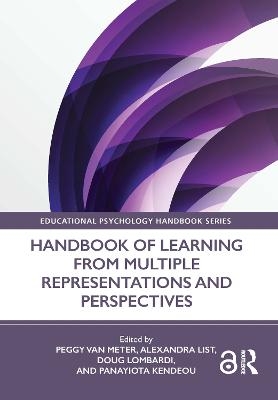
Handbook of Learning from Multiple Representations and Perspectives
Routledge (Verlag)
978-0-367-00117-9 (ISBN)
In and out of formal schooling, online and off, today’s learners must consume and integrate a level of information that is exponentially larger and delivered through a wider range of formats and viewpoints than ever before. The Handbook of Learning from Multiple Representations and Perspectives provides a path for understanding the cognitive, motivational, and socioemotional processes and skills necessary for learners across educational contexts to make sense of and use information sourced from varying inputs. Uniting research and theory from education, psychology, literacy, library sciences, media and technology, and more, this forward-thinking volume explores the common concerns, shared challenges, and thematic patterns in our capacity to make meaning in an information-rich society.
Chapter 16 of this book is freely available as a downloadable Open Access PDF under a Creative Commons Attribution-Non Commercial-No Derivatives 4.0 license available at http://www.taylorfrancis.com/books/e/9780429443961.
Peggy Van Meter is Associate Professor of Education and Director of Undergraduate and Graduate Studies in the Department of Educational Psychology, Counseling, and Special Education at the Pennsylvania State University, USA. Alexandra List is Assistant Professor of Education in the Department of Educational Psychology, Counseling, and Special Education at the Pennsylvania State University, USA. Doug Lombardi is Associate Professor in the Department of Human Development and Quantitative Methodology at the University of Maryland, USA. Panayiota Kendeou is Professor in the Department of Educational Psychology, Guy Bond Endowed Chair in Reading, and Director of Graduate Studies at the University of Minnesota, USA.
1. Loggers and Conservationists: Navigating the Multiple Resource Forest Through the Trees; 2. Cognitive and Socio-Cultural Theories on Competencies and Practices involved in Learning with Multiple External Representations; 3. Use of Multiple Representations by Experts and Novices; 4. Cognitive processes underlying learning from multiple representations; 5. Learning from Multiple Representations: Roles of Task Interventions and Individual Differences; 6. Interventions to Support Learning from Multiple External Representations; 7. Learning by Construction of Multiple Representations; 8. Problem Solving in Mathematics with Multiple Representations; 9. Beyond Trustworthiness: Comprehending Multiple Source Perspectives; 10. On the Roles of Dispositions and Beliefs in Learning from Multiple Perspectives; 11. Knowledge As Perspective: From Domain Perspective Learning to Interdisciplinary Understanding; 12. Processes and Products of Encountering Belief-Related Information; 13. The Role of Cognitive Conflict in Understanding and Learning from Multiple Perspectives; 14. Learning from Multiple Complementary Perspectives: A Systematic Review; 15. Learning from Multiple Perspectives: Processes and Strategies Associated with Reading Dual-Position Texts; 16. The Role of Validation in Integrating Multiple Perspectives; 17. Students' Perspectives Learning in a Disciplinary Multisource Task Environment; 18. The Roles of Executive Functions in Learning from Multiple Representations and Perspectives; 19. Putting Self-Regulated Learning and Metacognition into Multiple Representations and Perspectives; 20.Values, Attitudes, and Beliefs: Cognitive Filters Shaping Integration of Multiple Representations and Multiple Perspectives; 21.Motivation and the Processing of Multiple Inputs; 22. Emotions and Learning from Multiple Representations and Perspectives; 23. Relational Reasoning: The Bedrock of Integration Within and Across Multiple Representations, Documents, and Perspectives; 24. Using Critical Thinking Frameworks to Understand Integration of Multiple Inputs; 25. Assessing and Modifying Knowledge: Facts vs. Constellations; 26. The Challenge of Misinformation and Ways to Reduce Its Impact; 27. The Challenge of Fake News: Intellectual Survival in the Context of Multiple Representations and Perspectives; 28. The need for personalized learning and the potential of intelligent tutoring systems; 29. Representational Affordances for Collaborative Learning in Technology-Enhanced Environments; 30. The Challenge of Measuring Processes and Outcomes while Learning from Multiple Representations with Advanced Learning Technologies; 31. The Multiple Resources Learning Framework: Learning from Multiple Representations and Multiple Perspectives;
| Erscheinungsdatum | 23.03.2020 |
|---|---|
| Reihe/Serie | Educational Psychology Handbook |
| Zusatzinfo | 19 Tables, black and white; 11 Line drawings, black and white; 10 Halftones, black and white |
| Verlagsort | London |
| Sprache | englisch |
| Maße | 178 x 254 mm |
| Gewicht | 1070 g |
| Themenwelt | Geisteswissenschaften ► Geschichte |
| Geisteswissenschaften ► Psychologie ► Allgemeine Psychologie | |
| Geisteswissenschaften ► Psychologie ► Pädagogische Psychologie | |
| Geisteswissenschaften ► Psychologie ► Verhaltenstherapie | |
| Sozialwissenschaften ► Pädagogik | |
| ISBN-10 | 0-367-00117-9 / 0367001179 |
| ISBN-13 | 978-0-367-00117-9 / 9780367001179 |
| Zustand | Neuware |
| Informationen gemäß Produktsicherheitsverordnung (GPSR) | |
| Haben Sie eine Frage zum Produkt? |
aus dem Bereich


